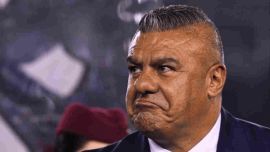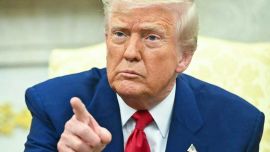Government officials from Beijing to Brussels have bruising memories of his first term, when tariffs on trade and doubts over US security commitments clouded relations, and worry what fresh uncertainty Trump 2.0 will bring. Some diplomats in Asia reacted to the US election outcome by swapping stunned emojis.
In Europe, even as leaders including UK Prime Minister Keir Starmer rushed to congratulate Trump on his victory over Kamala Harris, concerns centre on the president-elect’s campaign assertions that he’d immediately end the war in Ukraine, potentially forcing Kyiv to make territorial concessions to invading Russian forces. French President Emmanuel Macron held a call early Wednesday with German Chancellor Olaf Scholz to coordinate on what he called “this new context.”
While Trump’s campaign was avowedly US-focused, pledging to “fix” America – he didn’t mention any aspect of foreign policy in his victory speech to campaign workers — experience of his four years as president suggest plenty of turbulence ahead for allies and adversaries alike.
China, a rare bipartisan target in Washington, is in the crosshairs of a new Trump administration, with his calls for tariffs of as much as 60% on Chinese goods. His victory “means pessimism and uncertainty,” said Da Wei, director of the Center for International Security and Strategy at Tsinghua University in Beijing.
Discussion among international businessmen, bankers and lawyers in Hong Kong at a watch party organised by the US consulate revolved around the risks of Trump’s return and the rocky road ahead. One warned of a ratcheting up of rhetoric and swipes at the former British colony, where a political crackdown has drawn criticism from the US and its allies. The city’s officials are already primed to overreact, making the overall environment much tougher for international business, they said.
Chinese Foreign Ministry spokeswoman Mao Ning told a regular press briefing in Beijing on Wednesday that China’s policy toward the US is consistent and will continue to be handled “with the principles of mutual respect” and cooperation.
Prepare for the Worst
Behind the scenes, however, “the Chinese government is always trying to prepare for the worst,” said Zhu Junwei, a former researcher in the People’s Liberation Army who is now director of American research at Grandview Institution in Beijing. While “there will be a lot of fear in the trade sector” from the get go, Zhu noted that China wasn’t alone in having concerns about Trump’s return. “Will it give China more space and opportunities for diplomacy? Maybe.”
Others reveled in what would have seemed improbable if not impossible after Trump’s 2020 defeat to Joe Biden, sensing opportunities ahead. Israel may feel further emboldened in responding to Hamas, Hezbollah and Iran — Prime Minister Benjamin Netanyahu was quick to hail “history’s greatest comeback!” in a post on X addressed to “Dear Donald and Melania Trump.”
Argentine President Javier Milei, a self-styled libertarian, was ecstatic and congratulated billionaire Trump donor Elon Musk by text message on Wednesday, according to a person familiar with the matter. Milei and Musk have met at least three times this year.
Brazilian President Luiz Inacio Lula da Silva, known as Lula, will pick his battles with Trump, and climate is one of them, according to three people familiar with his agenda. Brazil, the host of this year’s G-20 summit, expects President Joe Biden to support Lula’s proposals for a global alliance against hunger and reform of multilateral organisations, yet predicts that Trump will subsequently withdraw from these commitments. Lula intends to use these divergences, where he seems to have a majority of global support, to his advantage, the people said.
Indian officials were upbeat as the election results rolled in, and cited Prime Minister Narendra Modi’s personal connection with Trump as a plus. Officials expect a new Trump administration to be less stringent in demanding accountability from India’s government for its alleged involvement in crimes against dissidents living abroad. The US has charged an Indian government agent of ordering the assassination of a Sikh separatist on American soil, while Canada has accused Modi’s government of involvement in the killing of another Sikh activist in that country.
New Delhi also expects the Trump administration to be more responsive to its security concerns in South Asia, the officials said. That’s especially true in neighbouring Bangladesh, where protests led to the ouster of India’s long-time ally Sheikh Hasina, and the emergence of economist-turned-politician Muhammad Yunus as the leader.
AUKUS, Taiwan
In Australia, which signed the AUKUS defence deal with the outgoing Biden administration and the UK government in response to Chinese expansionism in the region, lawmakers struck a resigned tone in private, according to a diplomat with knowledge of their exchanges. They had expected the result, even if they didn’t want it, and now they’re focused on getting the most they can out of the Trump administration, the person said.
In Taiwan, the democratically ruled islands which China claims as its territory, concerns focus on Trump’s “unpredictability and isolationism,” according to Chen Fang-yu, assistant professor of the Department of Political Science at Soochow University, citing the possible undermining of AUKUS and security cooperation between the US, Japan and the Philippines.
Trump has questioned whether the US would come to the global semiconductor hub’s aid if China were to invade or blockade the archipelago. “Trump still sees the islands as bargaining chips in negotiations with China, or something affiliated to China affairs,” said Chen. “He himself does not care about Taiwan at all.”
Japan will likely step up efforts to look into the potential impact of tariffs on goods sent to the US, including by talking to companies and analysing trade data, government officials said. Prime Minister Shigeru Ishiba may have an opportunity to meet with Trump during an expected aircraft refuelling stop in the US on his way back from the Group of 20 summit in Brazil later this month.
One Japanese official said that Tokyo hopes to rekindle something like the close relationship Trump had with late Prime Minister Shinzo Abe during Trump’s first term, when they bonded over golf. Japanese officials frequently cite that friendship as a factor in maintaining stable ties, despite Trump’s criticism of Japan’s trade surplus with the US and what it pays for US military protection.
Security considerations are similarly evident in South Korea, which has been looking to sign a deal with the US and Japan formalising their security partnership against threats from North Korea. Trump’s victory casts doubt over the prospects of a proposed trilateral summit by year-end.
Decisions over how Seoul responds to North Korea’s dispatch of troops to Russia to help with Vladimir Putin’s war on Ukraine will now be reviewed with the US election results factored in, according to a government official.
Ukraine’s fate
Trump’s running mate JD Vance has argued that the US should focus more on Asia, rather than on Ukraine, comments which add to Europe’s unease. European Union leaders will discuss the US election results on Thursday over dinner before a scheduled summit on Friday in Budapest.
Trump’s proposals for tariffs of 20% on US imports would hit a trading bloc like the EU hard, with exports of goods to the US worth a little over €500 billion ($536 billion) last year, according to the European Commission, the bloc’s executive arm. The EU has prepared a list of US goods it could target if Trump wins and follows through with punitive trade measures, Bloomberg reported last month.
Friday’s summit host, Hungarian Prime Minister Viktor Orban, a pioneer of what he terms “illiberal democracy” who has been lauded by Trump, toasted the former president’s win as bringing “hope for peace” to the world. Orban has repeatedly clashed with the EU over aid for Ukraine and maintains close ties to Moscow.
Other EU leaders draw another conclusion, that Ukraine could be left hanging without US support and so Europe will need to step in and become more autonomous in defence. According to one senior diplomat, Europe has an interest in a positive relationship with the US, but there can be no underestimation of what is at stake for EU security and prosperity. The answer lies in a strong and sovereign Europe, the person said. Another diplomat said that this could be a defining moment for Europe.
Such a path would require easing debt rules in Germany, the bloc’s biggest economy and a frequent target of Trump’s during his first term, to allow more spending, according to Nils Schmid, foreign policy spokesman for Scholz’s Social Democratic Party. “The so-called debt brake in Germany needs to be reformed because we need to spend more on defence for our own defence, for Nato, but also in order to support Ukraine,” Schmid told Bloomberg Television.
Any notion of Trump helping spur European cohesion was damped elsewhere, with multiple sources saying that Europe hasn’t managed to take such action to date. Those initial reactions of shock and pessimism were reinforced by officials who cited the fact many EU governments remain opposed to joint borrowing, ruling out the funding needed for grand plans on defence. A lack of leadership is another factor counting against European unity, the people said.
One winner from this election appears to be Putin. “One way or another, Trump is going to end the war in Ukraine, and I don’t think he’s going to ask Russia to capitulate,” said Kishore Mahbubani, a former top bureaucrat in Singapore’s Foreign Ministry and president of the UN Security Council. “The biggest losers from this election are the Europeans for sure, by far.”
– Bloomberg



















Comments